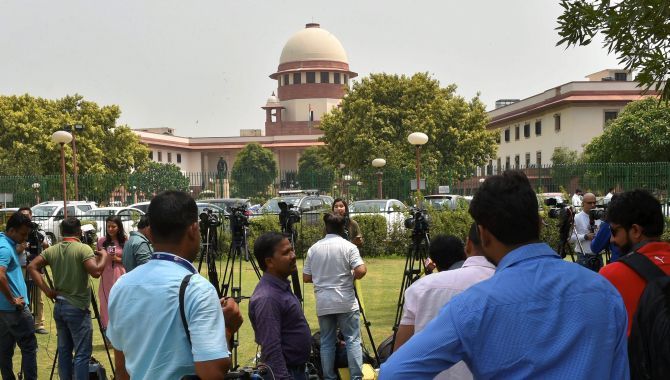In an unprecedented order to check criminalisation of politics, the Supreme Court on Tuesday held nine political parties including the ruling BJP and JD (U) in Bihar guilty of contempt and fined eight of them for violating its February, 2020 order on publication of criminal antecedents of their candidates for the assembly polls.

In an unprecedented order to check criminalisation of politics, the Supreme Court on Tuesday held nine political parties including the ruling BJP and JD (U) in Bihar guilty of contempt and fined eight of them for violating its February, 2020 order on publication of criminal antecedents of their candidates for the assembly polls.
The top court also modified its earlier order to make it clear that political parties must publish the criminal antecedents of their candidates, if any, within 48 hours of their selection, as it lamented the apathy of the government's legislative wing in not taking steps to decriminalise the political system and that political parties refuse to wake up from "deep slumber".
Maintaining that persons with criminal antecedents and involved in criminalisation of politics cannot be permitted to be law-makers, the apex court said it can only appeal to the "conscience" of lawmakers and hope they will wake up soon and carry out a "major surgery" for weeding out the malignancy of criminalisation in politics.
"The nation continues to wait, and is losing patience. Cleansing the polluted stream of politics is obviously not one of the immediate pressing concerns of the legislative branch of government," a bench headed by Justice R F Nariman said in its 71-page verdict on a plea seeking contempt action against several political parties including the BJP and the Indian National Congress (INC) for non-compliance of its February 13, 2020 directions during the Bihar assembly polls. The contempt plea was filed by Brajesh Singh, a lawyer from Bihar.
Highlighting the separation of power, the verdict noted that the top court has been appealing time and again to the law-makers of the country to rise to the occasion and take steps for bringing out necessary amendments so that the involvement of persons with criminal antecedents in polity is prohibited.
"All these appeals have fallen on deaf ears. The political parties refuse to wake up from deep slumber. However, in view of the constitutional scheme of separation of powers, though we desire that something urgently requires to be done in the matter, our hands are tied and we cannot transgress into the area reserved for the legislative arm of the State."
The bench also issued more directions in continuation of the earlier ones in order to make "the right of information of a voter more effective and meaningful."
"Political parties are to publish information regarding criminal antecedents of candidates on the homepage of their websites, thus making it easier for the voter to get to the information that has to be supplied. It will also become necessary now to have on the homepage a caption which states 'candidates with criminal antecedents'."
The apex court directed the Election Commission of India (ECI) to create a dedicated mobile application containing information published by the candidates regarding their criminal antecedents so that voter gets information on his or her mobile phone at one stroke.
The bench, also comprising justice B R Gavai, imposed a fine of Rs five lakh each on the Communist Party of India-Marxist(CPI-M) and the Nationalist Congress Party(NCP), saying they "have not at all complied with the directions issued by this court".
It imposed a fine of Rs one lakh each on the Janata Dal-United (JD-U), the Rashtriya Janata Dal (RJD), Lok Janshakti Party(LJP), INC, Bharatiya Janata Party(BJP) and the Communist Party of India (CPI) and asked them to deposit the money within eight weeks with the poll panel. The Rashtriya Lok Samta Party (RLSP) was spared of the fine.
The poll panel had earlier said that 469 candidates with criminal antecedents were fielded by 10 political parties in the Bihar assembly polls held in October-November last year.
The bench held that the selection of candidates having criminal antecedents on the ground of mere winnability is a violation of the apex court's direction given in 2020.
In its 2020 verdict, the top court had directed the political parties to upload on their websites and social media platforms the details of pending criminal cases against their candidates and the reasons for selecting them as also for not giving ticket to those without criminal antecedents. The order required them to publish antecedents of candidates within 48 hours of selection or not less than two weeks before filing of nominations and also in a particular format.
The Election Commission, to whom the fine will be deposited, is directed to carry out an extensive awareness campaign to make every voter aware about his right to know and the availability of information regarding criminal antecedents of all contesting candidates, the top court said on Tuesday.
"This shall be done across various platforms, including social media, websites, TV ads, prime time debates, pamphlets, etc. A fund must be created for this purpose within a period of 4 weeks into which fines for contempt of Court may be directed to be paid."
The court said that no one can deny that the menace of criminalisation in the Indian political system is growing day by day.
"Also, no one can deny that for maintaining purity of political system, persons with criminal antecedents and who are involved in criminalisation of political system should not be permitted to be the law-makers. The only question is, whether this Court can do so by issuing directions which do not have foundation in the statutory provisions."
It said though nine political parties have been found guilty of having committed contempt of the order of February 13, 2020, but a lenient view has been taken taking into consideration the fact that these were the first elections which were conducted after issuance of the directions.
"However, we warn them that they should be cautious in future and ensure that the directions issued by this Court as well as the ECI are followed in letter and spirit", said Justice Nariman, writing the verdict for the bench.
The bench modified one of its earlier directions on furnishing of details about the criminal antecedents of candidates.
"We clarify that the direction in paragraph 4.4 of our Order dated 13.02.2020 be modified and it is clarified that the details which are required to be published, shall be published within 48 hours of the selection of the candidate and not prior to two weeks before the first date of filing of nominations," it said.
The apex court accepted the submissions of senior advocate Vikas Singh, appearing for the poll panel, that the ECI cannot be said to have committed any contempt of the order as the circumstances pointed out that it did bring to the notice of the court the flouting of the directions.
"We must, however, caution the ECI to do so as promptly as possible in future so that prompt action may be taken by this Court, it being understood that the ECI must by itself take prompt action in accordance with the directions contained in this order," the top court said.











 © 2025
© 2025